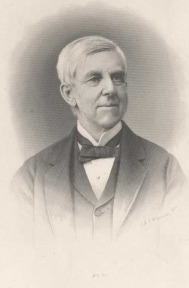Devices of Sound
the techniques of deploying the sound of words, especially in poetry. Among devices of sound are rhyme, alliteration, assonance, consonance, and onomatopoeia. The devices are used for many reasons, including to create a general effect of pleasant or of discordant sound, to imitate another sound, or to reflect a meaning.
The Last Leaf
Oliver Wendell Holmes
I saw him once before,
As he passed by the door,
And again
The pavement stones resound,
As he totters o’er the ground
With his cane.
They say that in his prime,
Ere the pruning-knife of Time
Cut him down,
Not a better man was found
By the Crier on his round
Through the town.
But now he walks the streets,
And he looks at all he meets
Sad and wan,
And he shakes his feeble head,
That it seems as if he said,
“They are gone.”
The mossy marbles rest
On the lips that he has prest
In their bloom,
And the names he loved to hear
Have been carved for many a year
On the tomb.
My grandmamma has said—
Poor old lady, she is dead
Long ago—
That he had a Roman nose,
And his cheek was like a rose
In the snow.
But now his nose is thin,
And it rests upon his chin
Like a staff,
And a crook is in his back,
And a melancholy crack
In his laugh.
I know it is a sin
For me to sit and grin
At him here;
But the old three-cornered hat,
And the breeches, and all that,
Are so queer!
And if I should live to be
The last leaf upon the tree
In the spring,—
Let them smile, as I do now,
At the old forsaken bough
Where I cling.
“The Last Leaf”, by Oliver Wendell Holmes, consists of several devices of sound, such as; rhyme, alliteration, onomatopoeia, and dialog. The rhyme scheme used throughout the poem is aabccb, and the syntax consists of 2 short sentences, 2-3 words, 2 short sentences, and finishing off the stanza with 2-3 words. Some examples of the alliteration used in this poem are; “mossy marbles”, “last leaf”, and “through the town”. An example of onomatopoeia can be found in the sixth stanza, “And a melancholy crack”. The dialog in this poem is found in the third stanza, when the crier says to the narrator “They are gone”.

"Don't flatter yourself that friendship authorizes you to say disagreeable things to your intimates. The nearer you come into relation with a person, the more necessary do tact and courtesy become. " ~Oliver Wendell Holmes
Oliver Wendell Holmes

Oliver Wendell Holmes (1809-1894), American physician and author, contributed to the advancement of medicine and wrote witty essays and popular poems.
Oliver Wendell Holmes was born in Cambridge, Mass., on Aug. 29, 1809, scion of a well-established New England family. Following his graduation from Harvard in 1829, he studied at the law school for a year (during which time he wrote the popular poem "Old Ironsides"). He gave up law in favor of a career in medicine. He rounded out his training at the Harvard Medical School with 2 years of study in Paris (1833-1835), where he learned new techniques and approaches in medicine, reflected in two important early papers, "Homeopathy, and Its Kindred Delusions" (1842) and "The Contagiousness of Puerperal Fever" (1843).
Holmes took his medical degree at Harvard in 1836. From 1838 to 1840 he served as professor of anatomy at Dartmouth College. In 1840 he married Amelia Lee Jackson and returned to general practice. He was appointed Parkman professor of anatomy and physiology at Harvard Medical School in 1847 and served as dean from 1847 to 1853. Holmes remained at Harvard until 1882 and established himself as an excellent lecturer and teacher.
Holmes's deterministic belief that man was the product of his heredity and environment provided the direction for his three pioneering, psychologically oriented "medicated" (as he termed them) novels: Elsie Venner (1861), The Guardian Angel (1867), and A Mortal Antipathy (1885).
As scientist, teacher, lecturer, essayist, and writer of light verse, Holmes left his mark on his age, and many honors came to him both at home and abroad. He died on Oct. 7, 1894.
(http://www.bookrags.com/biography/oliver-wendell-holmes/)
